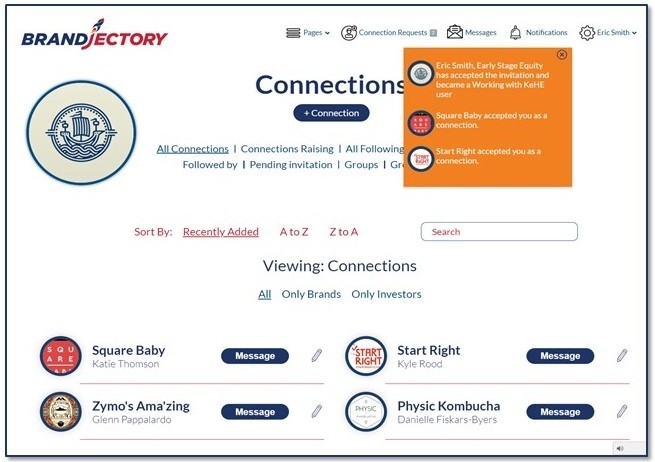Online platform Brandjectory is ‘like Facebook for young brands & investors’ in natural products space

A virtual platform that launched last month, “Brandjectory is like Facebook for young brands and investors,” says Tom Malengo, chief business officer and co-founder of The Litchfield Fund, which created the platform along with JPG Resources and The Movitz Group.
Malengo explained to FoodNavigator-USA that Brandjectory is a platform where entrepreneurs in the natural products industry can reach out to investors who are focused on better-for-you brands and keep them updated as they grow and reach milestones but without the hassle of scheduling meetings, fenagling introductions or cold-calling.
Like Facebook, emerging brands can post real-time updates on Brandjectory about their products, “which are their kids,” including news about distribution, product development, feedback from consumers and other news that is akin to how people share stories on Facebook about their children playing soccer, going to college or attending a family or high school reunion, Malengo said. He added that investors can opt to follow brands or reach out if they want to learn more.
“What we are trying to create with Brandjectory is a place where people interested in each other and what is going on can keep the conversation moving forward,” he added.
A “one-of-a-kind” platform
A major difference between Brandjectory and Facebook, LinkedIn or other social media platforms that operate on a similar basis is that Brandjectory is focused on a finely curated group of people who are actively interested in the natural products space and in building relationships and meaningful conversations before, during and after a capital raise, Malengo explained.
“When you think about LinkedIn or Facebook or Twitter or Instagram – or any of them – but Instagram, Twitter and Facebook especially, for young companies these are consumer focused and places where you are trying to attract people to your brand. And when you think about LinkedIn, it is a hodgepodge … of people who are posting all kinds of things and people have gone in and out of different industries,” he said.
“What we are doing is something completely different from any of those,” he said, explaining that Brandjectory is “totally focused” on fundraising and growing emerging brands, but it is not a crowdfunding or fundraising website.
“The idea we are trying to build here is relationships, growth and interaction that can help a brand grow at any point of time” – whether it is as a pre-seed company simply looking to make connections and raise awareness, but not yet funds, or a company that has just closed a fundraising round and needs an easier way to keep investors apprised of their developments, Malengo said.
“We have designed this around the investor-brand relationship and interaction … for the full lifecycle of a brand. It is not just for a certain period of a brand’s time. We assume right now it will be brands getting on who want to build the relationships, but the way we designed it is it can be used for” maintaining relationships well beyond the initial fundraise, he added.
As Melengo noted, companies can do that by posting updates and sharing news, but he said they can also form groups with investors or others on the platform and post financial numbers with privacy to only those with whom they are connected.
Benefits for investors
Just as Brandjectory simplifies networking for emerging brands, it also simplifies prospecting for investors by establishing “a more robust and relevant pipelines of companies seeking relationships and capital,” and sharing “high-quality, emerging brands in an easily searchable ecosystem,” according to the company.
Similarly, investors have control over inbound invitations and can post publicly or message privately. Investors also can form groups with each other to exchange tips, information or form coalitions to invest in or advise brands, Malengo said.
Beyond the pandemic
While the shelter-in-place orders that accompanied the ongoing pandemic underscored the need for Brandjectory as it launched in May, Malengo said the platform, which was two years in the making, will benefit the natural products industry long after states open up again and conferences and travel resume.
“There are always going to be limits to travel,” including unexpected delays or cancellations, and this platform lowers the stakes for in-person meetings so that brands and investors can more easily evaluate if trips – and trade shows – are an effective or efficient use of resources, he said.
He explained that brands spend a lot of money to have booths, ship products and man their booths at trade shows for thousands of people to walk by, but the team wondered if there was a way to add more value to that process. In addition, with conferences on hiatus, brands can use Brandjectory to find and build relationships, cost effectively. When those conferences restart and the brands can attend, Brandjectory will have helped the relationships they have already made continue to grow face-to-face. For new relationships, Brandjectory keeps the conversation going after the event ends.
To help brands and investors better understand how Brandjectory works and meets this need, the company is offer two months access to the platform for free, for a limited time. The site is also free for as long as brands are building their profile, but as soon as they go live it is $39 a month per user for brands and $59 a month per user for investors.












